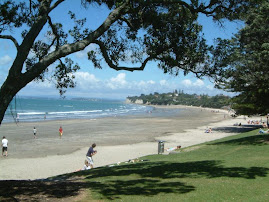
(b) I found this photo of a sparrow by Nick Chill on Flickr. It has an Attribution-Noncommercial-No Derivative Works 2.0 Generic Creative Commons licence which means it can be shared (copied) on condition that it is attributed to the licensor and is not used for commercial purposes. It may not be altered or transformed in any way. http://farm4.static.flickr.com/3434/3395546202_e3a488980d_t_d.jpg
Creative Commons enables writers and photographers to publish their work online on clearly stated terms. This encourages more people to share their work and allows greater flexibility of use while still maintaining copyright.


 Takapuna Time
Takapuna Time
